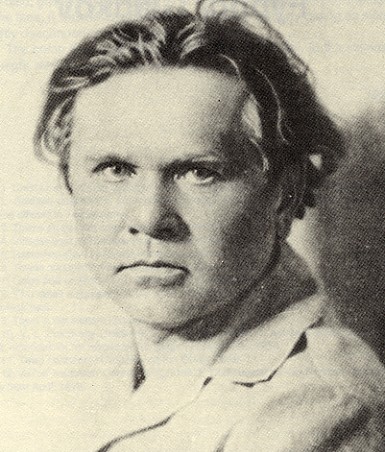presents
 Gladkov, Fyodor Vasilyevich. Born 9 June (Old
Style--21 June New Style) 1883 into poor
family of Old Believers in the village of Chernavka, Saratov
Province. In 1895, family moves to Ekaterinodar (later, Krasnodar)
in the Kuban. He worked in chemist's shop and as apprentice
typesetter in a printer's shop. He eventually became a primary
school teacher and in 1902 moved to the Stretensk district of
Siberia, east of Lake Baikal. In 1904 he began propaganda work for
the Social Revolutionary Party in Chita, east of Irkutsk. In 1905
he enters a teachers' institue in Tiflis. In 1906 he begins
propaganda work for Bolsheviks and returns to Stretensk. In
November 1906 he is arrested and exiled for four years to Manzurka
village in Irkust province for four years. After exile, he moves
to Novorossiisk then to the Kuban where he is appointed head of a
primary shool in Pavlovskaya, a large Cossock village. In spring
of 1918, he returns to Novorossiisk to reorganize schools. The
town is captured by the Whites in August 1918 and Gladkov takes
refuge in the workers' settlement of a cement (surprise!) factory.
After Whites were driven out in 1920, he is put in charge of adult
education in the town. He served in the Red Army for a short time
and was made editor of the newspaper "Krasnoye Chernomorye". He
was also head of the regional department of Popular Education. In
1921 he moves to Moscowl where he works as head of a factory
school, then secretary of the journal "Novy Mir". He joined the
proletarian literary group "The Smithy". From 1932 to 1940 he
served on the editorial board of "Novy Mir". In 1941 he became
special correspondent for "Izvestiya", reporting from Svedlovsk,
and specializing in war-time industrial topics. After the war,
from 1945 to 1948 he was director of the Gorky Literary Institute
in Moscow.
Gladkov, Fyodor Vasilyevich. Born 9 June (Old
Style--21 June New Style) 1883 into poor
family of Old Believers in the village of Chernavka, Saratov
Province. In 1895, family moves to Ekaterinodar (later, Krasnodar)
in the Kuban. He worked in chemist's shop and as apprentice
typesetter in a printer's shop. He eventually became a primary
school teacher and in 1902 moved to the Stretensk district of
Siberia, east of Lake Baikal. In 1904 he began propaganda work for
the Social Revolutionary Party in Chita, east of Irkutsk. In 1905
he enters a teachers' institue in Tiflis. In 1906 he begins
propaganda work for Bolsheviks and returns to Stretensk. In
November 1906 he is arrested and exiled for four years to Manzurka
village in Irkust province for four years. After exile, he moves
to Novorossiisk then to the Kuban where he is appointed head of a
primary shool in Pavlovskaya, a large Cossock village. In spring
of 1918, he returns to Novorossiisk to reorganize schools. The
town is captured by the Whites in August 1918 and Gladkov takes
refuge in the workers' settlement of a cement (surprise!) factory.
After Whites were driven out in 1920, he is put in charge of adult
education in the town. He served in the Red Army for a short time
and was made editor of the newspaper "Krasnoye Chernomorye". He
was also head of the regional department of Popular Education. In
1921 he moves to Moscowl where he works as head of a factory
school, then secretary of the journal "Novy Mir". He joined the
proletarian literary group "The Smithy". From 1932 to 1940 he
served on the editorial board of "Novy Mir". In 1941 he became
special correspondent for "Izvestiya", reporting from Svedlovsk,
and specializing in war-time industrial topics. After the war,
from 1945 to 1948 he was director of the Gorky Literary Institute
in Moscow.First published work, "Towards The Light" (1900), tells the tale of a young girl who becomes a village teacher and dedicates herself to the service of common people. "After Work" (1900) and "Maksuitka" (1901) are stories of the downtrodden. Other early stories include "Before Hard Labor" (1903), "They Went Off to War" (1904) and "The Inspection" (1905). "Three In One Hut" (1905) relates his meeting with three women convicts serving exile in Siberia. "The Outcasts" (1908) is a series of sketches about the lives of political exiles. "The Abyss" (aka "The Only Son") (1917) is a picture of village life during World War I. "Spring Shoots" (1921) and "The Fiery Steed" (1922) are civil war tales. "Cement" appeared in 1925 and was hailed a the first Soviet novel of the working class. "The Old Secret Prison" (1926) is set in an Irkutsk political prison. "THe Cephalopodous Man" (1927) is a satirical tale. "Energy" (aka "Power") (1932-1938) dealt with the construction of the Dneproges hydroelectric plant, but was not as successful as "Cement". "The Birch Grove" (1941) is a lyrical forest story. "The Scorched Soul" (1943) and "The Vow" (1944) are collections of tales. He spent his later years on a series of autobiographical works: "Story of My Childhood" (1949), "The Outlaws" (1950), "Evil Days" (1954), and "Restless Youth" (unfinished). The first two volumes won Stalin Prizes in 1950 and 1951. He died 20 December 1958. Source: Luker, Nicholas. "From Furmanov to Sholokhov", Ardis 1988. |